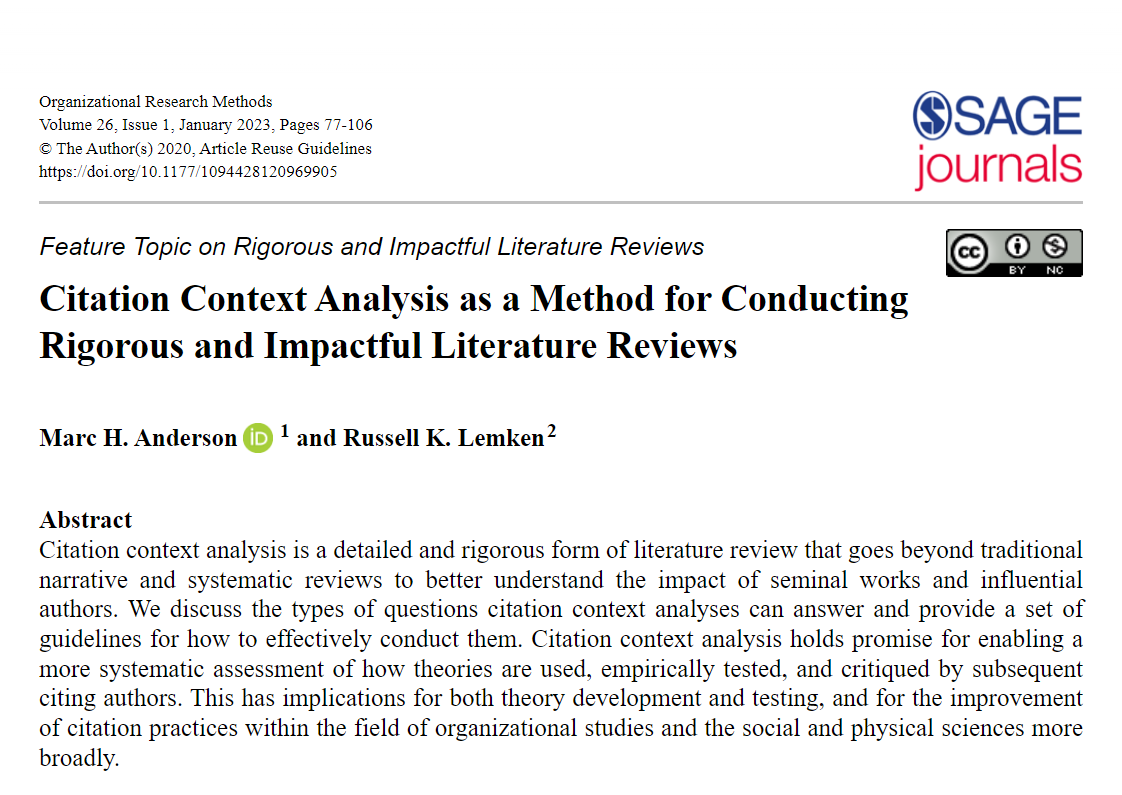Citation Context Analysis
by Janet Salmons, PhD, Research Community Manager for SAGE Methodspace.
What difference did a publication make?
Seminal writings and important texts, are referenced by scholars who agree with or contest them. What can we learn by studying the citations? What parts of the original research get attention, what claims are studied further?
In this interview Dr. Marc Anderson explains how and why to use citation context analysis. He explains and builds on “Citation Context Analysis as a Method for Conducting Rigorous and Impactful Literature Reviews,” with Russel K. Lemken.
This article is part of a feature topic in the Organizational Research Methods journal, Rigorous and Impactful Literature Reviews. See the whole set of open-access articles and interviews with researchers here.
More Methodspace posts about literature reviews and review research
While progress has been made, social and systemic biases continue to produce inequities in scholarly reference lists, citational indexes, and even journal metrics. This guidance outlines steps that researchers can take toward achieving more inclusive and equitable scholarly citational practice.
Effectively conveying the reality of social inequalities can be challenging. Data visualization, however, serves as a powerful instrument to facilitate this crucial task. Sage’s Data Visualization multimedia collection offers expert guidance on techniques, tools, and best practices to support researchers in leveraging the power of data viz in their research.
Join Gary Thomas, author of ‘How to Do Your Literature Review’ as he discusses questions which arose in his recent webinar, ‘What is a Literature Review in the Age of AI?’. A link to the webinar recording can be found at the end of this blog post.
The new AI tools for conducting a literature review provide a remarkable resource both for professional researchers and students. They can rapidly scan millions of papers, provide digests and summaries in seconds, link cognate literature, and even draw maps of the literature showing how one piece relates to another.
Critical appraisal of research papers is a component of everyday academic life, whether as a student as part of an assignment, as a researcher as part of a literature review or as a teacher preparing a lecture. Learn more from this post.
Missed the Methodspace webinar “Analyzing Published Literature Across Paradigms and Disciplines”? View it here and find related resources.
Bondy Valdovinos Kaye, co-researcher for “The impact of algorithmically driven recommendation systems on music consumption and production - a literature review,” offers insights about the literature review process.
What is the difference between a literature review and a state of the science review? See an article by Dr. Joan Dodgson.
In this interview David Antons and Oliver Salge discuss the roles humans and machines can take to plan and conduct computational literature reviews.
In this interview Dr. Marc Anderson explains how and why to use citation context analysis to track impact of scholarly publications over time.
Dr. Brian Fox explains why systematicity is important in literature reviews.
In the article “Theorizing Through Literature Reviews: The Miner-Prospector Continuum” Dermot Breslin and Caroline Gatrell pose an intriguing question: do you approach the literature review as a miner or as a prospector? They discuss options in an interview.
How do decide what literature you need for a review? See this post featuring an interview Martin Hiebl and related open-access article about sample selection.
Garima Sharma and Pratima (Tima) Bansal discuss ways to engage with managers, professionals, or practitioners to learn from the literature using a systematic review process.
In this interview Dr. Herman Aguinis and Dr. Ravi Ramani discuss the article they wrote with Dr. Nawaf Alabduljader, “Best-Practice Recommendations for Producers, Evaluators, and Users of Methodological Literature Reviews.”
Find tips for organizing and synthesizing methodological sources for your literature review.
In this interview Dr. Matthew Cronin discusses the article he wrote with Elizabeth George, “The Why and How of the Integrative Review.”
How can you use published literature as data? In this Methodspace interview Dr. David Denyer explains how and why to use review research.
A critical step in planning and designing research entails reviewing literature to situate it in a research tradition.
Want to design and plan a review study? Find open-access examples of systematic reviews, meta-syntheses, meta–analyses, and integrative literature reviews. Also, learn more with related SAGE books.
Review research has become a credible and legitimate form of scientific inquiry in various fields of science including management and organizational sciences. Find open-access articles with practical advice about planning a review study.
Find an open-access guide to archival research and links to archives you can visit online.
What kinds of documents or archived materials fit your study?
Dr. Helen Kara offers suggestions for taking an ethical approach to your literature review.





























The process for researching literature on research methods is somewhat different from the process used for researching literature about the topic, problem, or questions. What should we keep in mind when selecting methods literature?